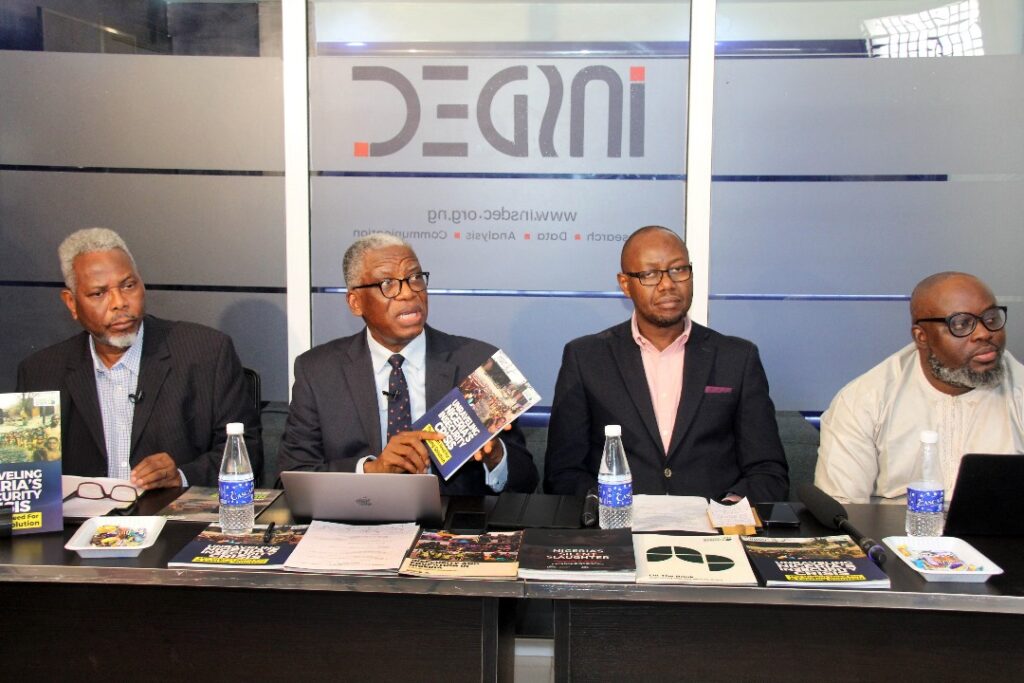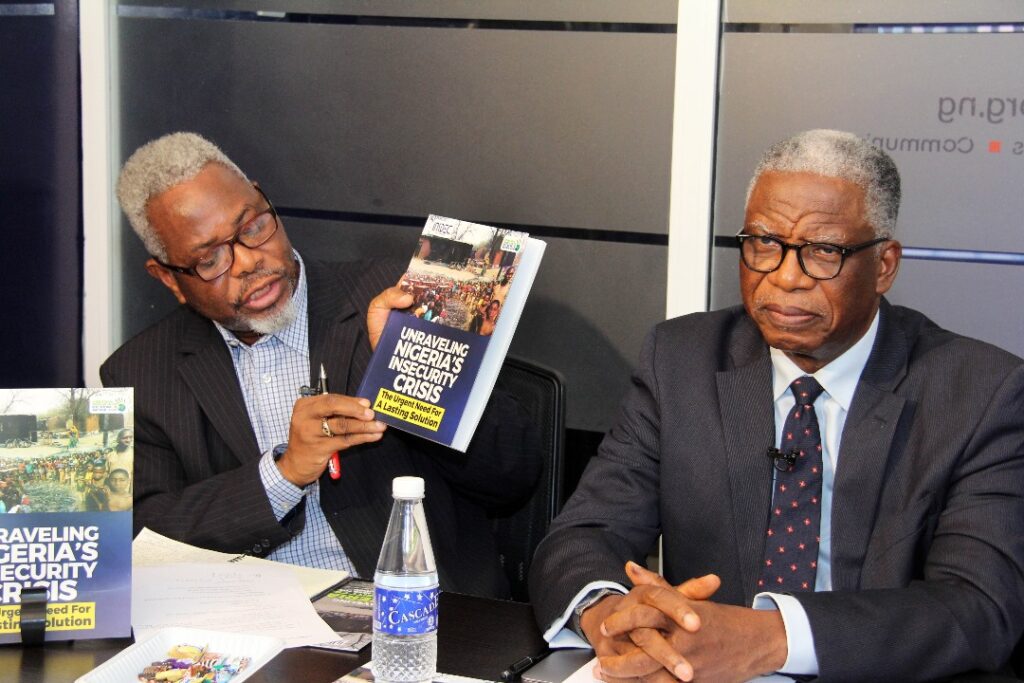Curbing Insecurity in Nigeria: The 10 Commandments From iNSDEC

Left to Right: Ogie Eboigbe, Executive Vice-President, iNSDEC, Dr. Richard Ikiebe, President, iNSDEC, Ayo Adedoyin, CEO, PSJ-UK and Richard Adeyinka Emmanuel, Co-Lead Researcher, during the formal launch in Lagos of the report titled, UNRAVELING NIGERIA'S INSECURITY CRISIS; THE URGENT NEED FOR A LASTING SOLUTION, recently.
By Ogie Eboigbe
Nigerian NGO, iNSDEC, released its long-awaited report on insecurity in Nigeria on the 1st of October, as the country marked its 64th independence anniversary.
The report, titled, ‘Unraveling Nigeria’s Insecurity Crisis: The Urgent Need for a Lasting Solution’, is the aftermath of research that iNSDEC carried out in two states – Benue and Imo, to determine the nature, character, impact, and consequences of insecurity from one part of the country to another.
The project is a collaboration between the Nigerian NGO and its British partners, PSJ-UK, whose Director/CEO, Mr. Ayo Adedoyin was in Nigeria for the formal presentation.
A major outcome is the finding that while insecurity affects all parts of the country in almost the same way, the attributes are different.
It notes that uncertainty, terror, fear, hunger, loss of life, and other dangerous outcomes affect all citizens, but how it does so, and what happens are different, from region to region, zone to zone, and state to state.
Hence, the NGO it has recommended that any solution that would be adopted and pursued must be targeted to each region and to each type of insecurity.
This means that instead of a militaristic approach, banditry, terrorism, kidnapping, cultism, separatist activism, oil bunkering and militancy should be tackled with carefully selected and determined strategies that are more likely to succeed in the different areas.

The report has received endorsements from several top Nigerians from different walks of life, including the academia, faith-based institutions, retired military officials and other security experts.
They include renowned public affairs analyst, Rev. Fr. Prof. Anthony Akinwale of Augustine University, Lagos and Air Vice Marshal JON Ode, Rtd, who both wrote the Forewords to the report; Mr. Stephen Enada, Founding President of the International Committee on Nigeria, ICON, Washington DC; Prof. Kingsley Moghalu, President of the Institute for Governance and Economic Transformation; Major-General Chris Olukolade, Rtd, Chairman, Centre for Crisis Communication and former Director of Defence Information in Nigeria; and Dr. Joachim Adebayo Adenusi, Research & Policy Director, PSJ-UK; while the Preface is written by Dr. Richard Ikiebe, President of iNSDEC and Director, PSJ-UK.
According to the iNSDEC report, a problem that lacks a clear definition and proper diagnosis cannot be effectively resolved, noting that superficial peace conferences, insincere inter-faith dialogues, and borrowed solutions from foreign contexts that disregard Nigeria’s unique culture and experiences offer no sustainable remedy.
Therefore, the report’s primary recommendation emphasises the imperative to contextualise and tailor solutions to Nigeria’s diverse insecurity challenges.
To achieve this, both the government and the elite class must take ownership of the crisis, striving to comprehend its nuances to accurately assess its magnitude.
Hear iNSDEC: “Addressing Nigeria’s security crisis demands a problem-specific, or region-specific approach that transcends the current militaristic paradigm.
The multifaceted nature of insecurity across different regions necessitates tailored strategies that move beyond simplistic explanations and one-size-fits-all solutions.”
The first of the NGO’s 10-point recommendations advises on stakeholders taking ownership of the nationwide problem:
Government Acknowledgement & Ownership:
The government must recognise and address the underlying causes of insecurity, which stem from failures in governance and leadership.
It should own the problem and actively work towards reclaiming territories overtaken by insurgents. For too long, the government has acted as an outsider, or a standby observer, as if the problem belonged to the communities only.
A bipartisan, non-sectarian National Study Group on insecurity should be established to identify the true nature of the perpetrators and provide informed and actionable strategies.
Comprehensive & Integrated Approach:
The country should tackle insecurity with a holistic strategy involving key societal leaders. This includes intentional engagement of community leaders, women’s organisations, media opinion leaders, civic thought-leaders, legal and law enforcement organisations, private security firms, and intelligence agencies.
The authorities should develop region-specific strategies to address the diverse nature of insecurity across different areas. Treating it as wholly military only, will not solve the problem at the roots, some of which are ideological, or issues of non-inclusion.
Advanced Technological Solutions:
Deploy surveillance systems such as unmanned aerial vehicles (UAVs) equipped with advanced cameras and thermal imaging technology for real-time monitoring.
Utilise data analytics, secure communication networks, drone surveillance, mobile applications for citizen reporting, and other advanced technological tools to combat insecurity.
Address the current gaps in technology, including lack of relevant technologies, inadequate manpower, insufficient training, and inadequate funding and policy backing.
Strengthening Security Sector & Governance:
Reform the security sector to improve training, equipment, and oversight, ensuring effectiveness and accountability.
Strengthen governance by upholding the rule of law, enhancing public trust, and addressing socio-economic grievances through education, job opportunities, and infrastructure development.
Community & State Policing Initiatives:
Fully embrace community policing to empower local communities in enhancing security. This includes establishing platforms for dialogue between security agencies and community leaders. Government must lead in this respect and not leave everything to NGOs, foreign funders and foundations.
Fast-track the adoption of state policing to allow localised policing arrangements and enhance community involvement in security processes.
Regional & International Collaboration:
Collaborate with neighbouring countries to secure borders and combat transnational threats through intelligence sharing, best practices, and resource allocation.
Seek support and collaborative engagement from key allies such as the United Kingdom, European Union, and the United States, particularly in intelligence sharing and counterterrorism strategies.
Humanitarian Efforts & Conflict Resolution:
Increase support for humanitarian efforts to assist displaced persons and affected communities with food, shelter, healthcare, and essential services.
Encourage negotiation and mediation at all levels of society to understand and resolve conflicts before they escalate.
Strategic Security Policy & Legal Framework:
Develop a comprehensive security policy document that addresses the issues of insecurity, incorporating relevant acts such as the Police Act, National Security Act, FRSC Establishment Act, NAMA and NCAA regulations, Nigerian Army Signals Act, and Armed Forces Act 2003.
Create new regulations for the holistic management of ungoverned spaces and general insecurity in Nigeria.
For The International Community:
The international community should first recognise the global implications of the crisis in Nigeria, the Lake Chad region, and the Sahel. Right now, there is what appears as a general denial of the atrocious level of the killings, kidnapping, and other atrocities such as forced enslavement and marriage of women and girl-child.
The international community should provide decisive support to Nigeria in combating these security challenges to prevent further escalation and regional instability.
International partners should provide targeted assistance to support Nigeria’s security and governance capabilities, including job creation, particularly for youths; and strengthening governance structures.
Strengthen collaboration with neighbouring countries to secure borders and combat transnational threats, enhancing intelligence sharing and border control and mitigate the spillover effects of the crisis.
Support Nigeria and other countries in the region through investments in socioeconomic development, governance reforms, and conflict resolution.
For Humanitarian Organisations:
Increase support for humanitarian efforts to assist displaced persons and affected communities, ensuring the provision of essential services and facilitating return to their ancestral lands.
Encourage negotiation and mediation at all societal levels as cost-effective means of resolving conflicts before they escalate.
iNSDEC pleads that its recommendations emphasise a multifaceted approach that includes governance reform, socio-economic development, community engagement, and international cooperation to effectively address the complex security challenges facing Nigeria.
To this end, the nation’s leadership authorities must ensure a comprehensive understanding of the nature and character of insecurity, and it must certify that such understanding saturates down to all stakeholders involved in providing the required policies and solutions to the insecurity problems.
It is after such an understanding of the issues at stake at the various levels that the government can come up with new policies and devise strategies that reflect the unique dynamics of each context, in acknowledgment that no one-size-fits-all solution can succeed in the present circumstances.
Mr. Ogie Eboigbe writes from Lagos, Nigeria
Read Also: Rivers’ Broken Peace: Unpacking The Wike-Fubara Feud








3 thoughts on “Curbing Insecurity in Nigeria: The 10 Commandments From iNSDEC”